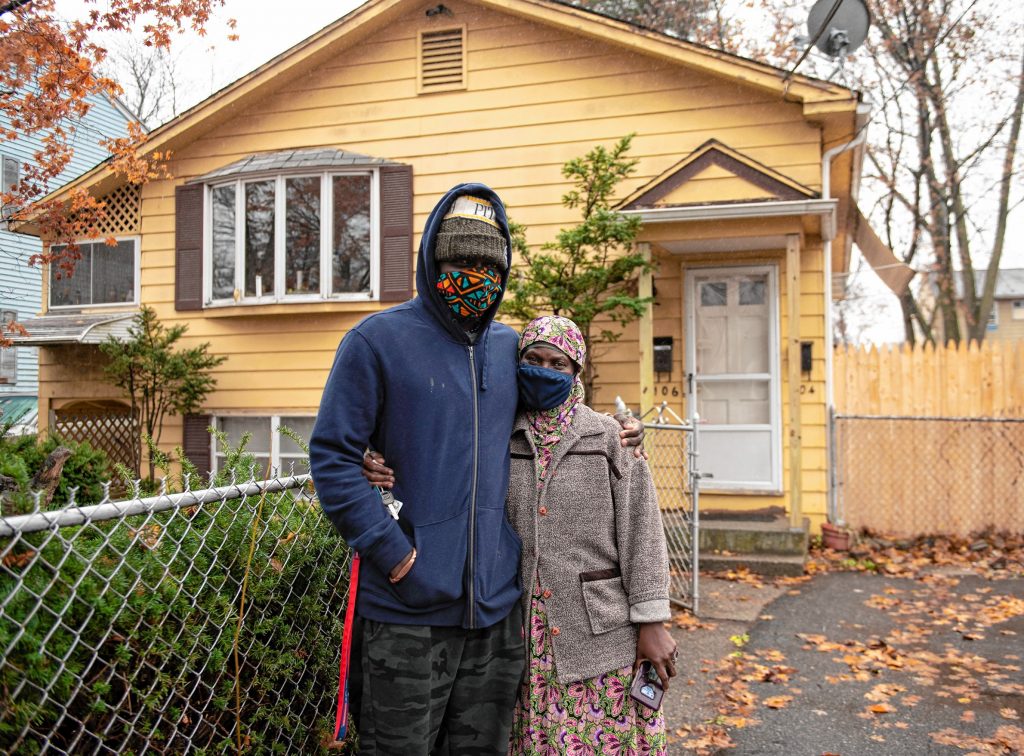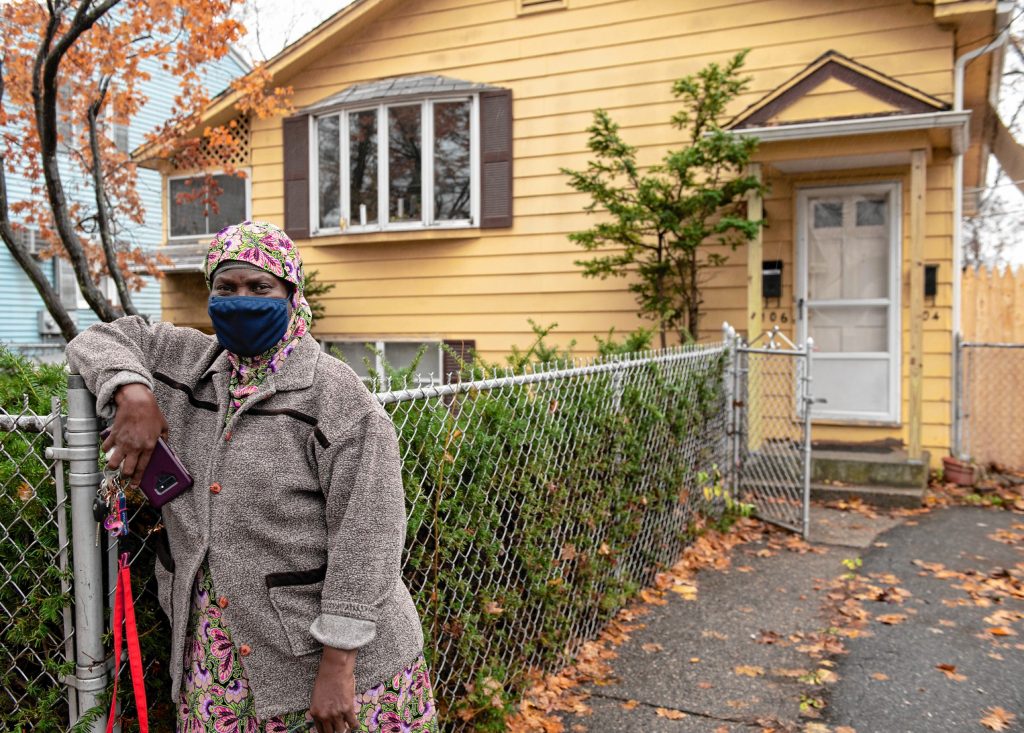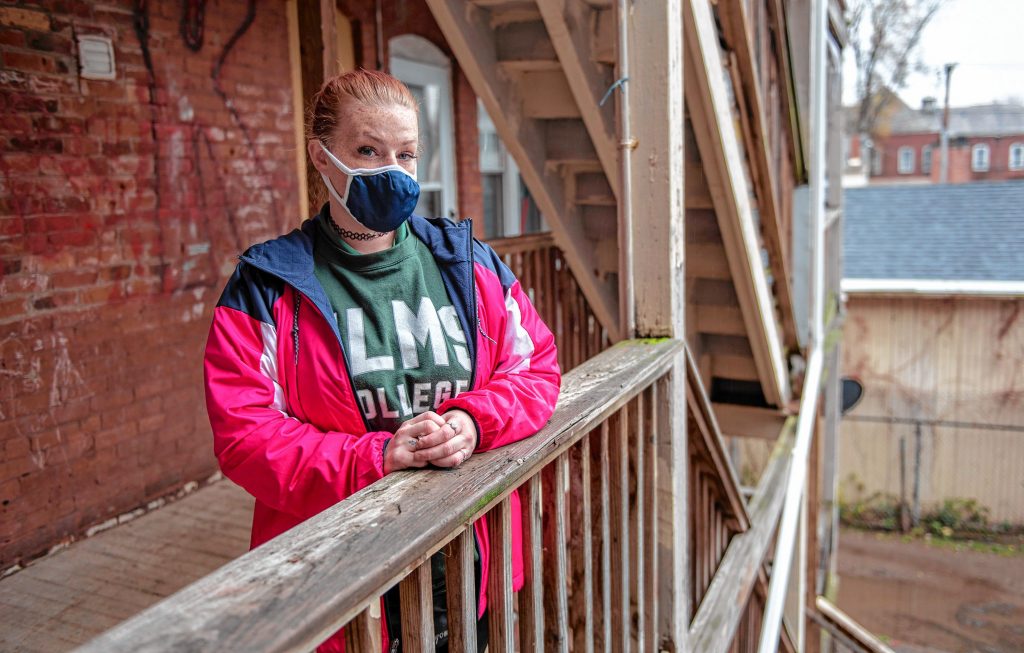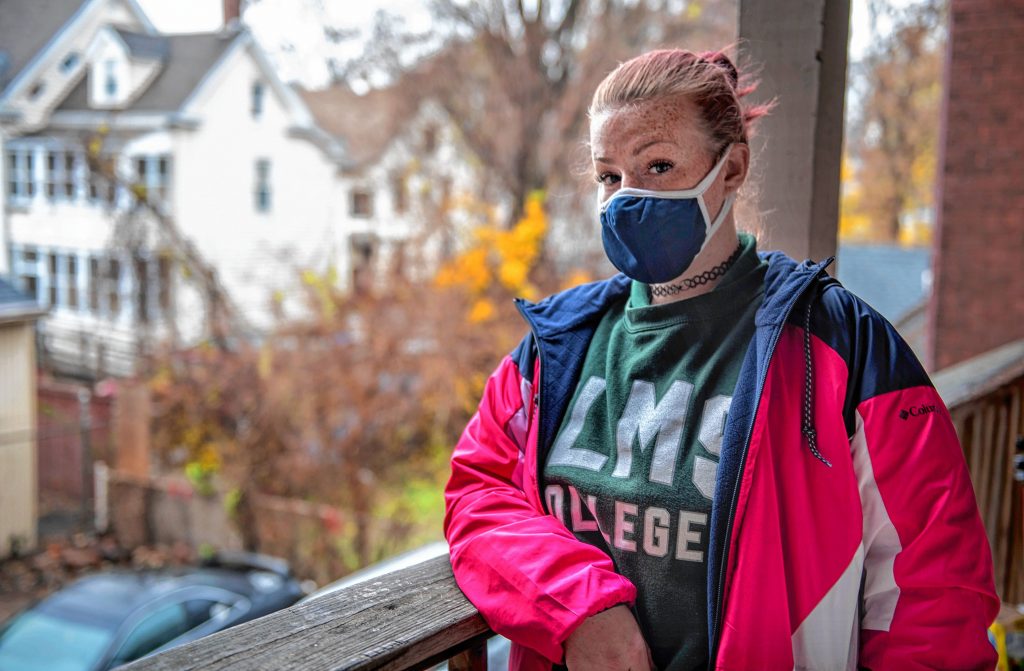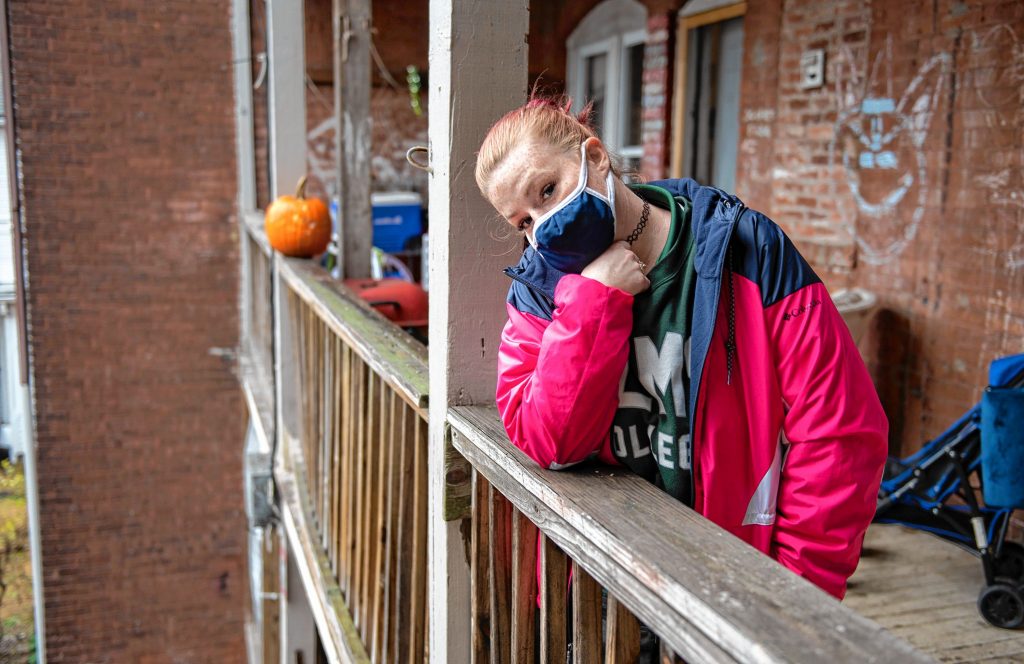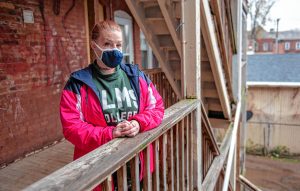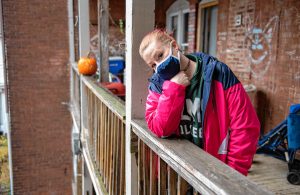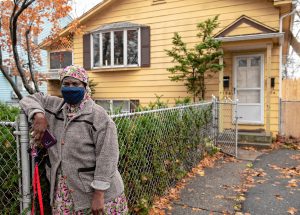All they want is a clean slate.
After nine-plus months of dealing with the tumultuous life upheaval caused by the pandemic – on-again, off-again jobs, opening and closing of public schools and the overall anxiety posed by COVID-19 – Paige Spaulding and her husband, Jordan Jones, are now facing an even scarier prospect: eviction.
Spaulding, 23, first lost her job as a barista at Elms College when the pandemic hit in March. She returned part time in August, but then found herself out of work again at the end of November when the college went all remote with COVID-19 cases rising. That left Spaulding, Jones and three young children (ages 2, 3 and 6) without her income.
The family has been having trouble making their $1,050 monthly rental payments with Jones out of work since March in his job as a mover and with Spaulding’s work situation. Then came a 30-day notice of eviction from their landlords.
“We were kind of sparse on that (rent) every couple of months and I fell into owing them rent due,” Spaulding said.
By no means is the Chicopee family alone. All across the region, experts who work with people facing eviction say hundreds of families are struggling to pay for shelter, one of life’s three “basic needs,” along with food and clothing. Those who work to help families and landlords in housing crisis, as well as many politicians who represent them, are calling for an extension of a national evictions moratorium established by the U.S. Centers for Disease Control that’s set to expire at the end of the year. They say Massachusetts, which lifted its eviction moratorium on Oct. 17, needs to provide a better safety net by beefing up a program designed to provide emergency rental assistance, among other initiatives including helping landlords who are also struggling to pay the bills because tenants aren’t paying rent.
A week before the state moratorium ended, Gov. Charlie Baker announced the COVID-19 Eviction Diversion Initiative, which includes up to $100 million in emergency rental assistance through the Residential Assistance for Families in Transition (RAFT) program, up to $12.3 million to provide tenants and landlords with legal representation and $50 million for post-eviction rapid rehousing.
Spaulding says the $4,000-plus in RAFT funds she received didn’t cover the gap in how rent she owed. “Here I am now, tomorrow is the last day of my job and my son’s school just got closed,” Spaulding said on Nov. 16. “My husband is out participating in a daily work search trying to find work due to COVID. And so, I have to be home with my son now. I can’t work. Regardless of whether Chicopee Public Schools closed or not, Nov. 24th my school will be closing because of COVID. It’s a possibility that we’ll be coming back in January, but there’s arrears because every month I can’t make the full $1,050. I have a car. I have three children. I have electricity. I had car problems, gas and insurance. Daily life expenses of five people and a house does very much add up.”
Spaulding has been evicted for non-payment of rent in the past while she was pregnant with her youngest child. That experience is something she never wants to repeat.
“I didn’t have $150 that one month. I had it all except for $150 and they were like, ‘Nope, we don’t even want it.’ I was like, ‘Are you kidding me?’ I waited for court and this and that. I eventually got evicted and I went into a shelter with my two kids, pregnant, on the fifth floor sharing an apartment with some other family,” she added. “I don’t want to get emotional. That’s something I never want to go through again.”
Although Spaulding and her family are facing eviction in the midst of the worsening pandemic, they’re trying to stay optimistic about their situation.
“Nothing will happen until January if it ever happens,” she added. “The money that I’m absolutely allotted, because I’ve been impacted by COVID, might become available to me. I might be able to pay them in full and not be in any arrears with them. Hopefully, I’ll start off on a clean slate.”
Landlords in a bind too
For small landlords who rely on rent from tenants to pay their mortgage, there’s challenges in the pandemic as well.
Sellou Coly, a 55-year-old Springfield resident and landlord who has owned a two-family rental property in the city since 2006, said she’s faced the prospect of foreclosure in the past and fears for the future if tenants aren’t able to pay their rent.
“We’re all in the same boat,” she said. “If renters aren’t able to pay and I’m not working, I cannot dig from anywhere to pay the rent besides maybe going through retirement or 401(k).”
Spaulding agrees that the COVID-19 pandemic is just as challenging for small landlords such as Coly.
Coly thinks a moratorium on evictions is beneficial to tenants and landlords alike during the pandemic, but stressed that the state or federal government needs to provide relief for smaller landlords such as herself who need financial support right now.
One of her tenants recently lost their job, but not due to the pandemic. She said she’s been working with that tenant who continues to pay rent whenever they’ve been able to make payments. She understands that they have to balance paying the rent with other costs of living such as food, transportation or health care.
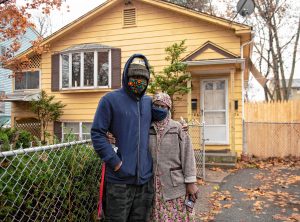
Sellou Coly stands in front of the home she is the land lord of in Springfield with her son, Ahmed Diaite, who rents one of the apartments.
But Coly doesn’t think evicting her tenants is an option for her.
“I can’t do that,” she added. “The reason why I cannot do that is because I’ve been there and I know the difficulties. I cannot do that to another person. I know money is money and business is business, but we have to have the human side of everything.”
More relief needed
Despite the efforts of the Baker-Polito administration with the COVID-19 Eviction Diversion Initiative, many believe more housing relief is needed in the midst of another wave of the pandemic.
Across the United States there’s an eviction crisis taking place right now. Nationally, between 30 million and 40 million people are at risk of losing housing due to non-payment of rent or mortgage, according to analysis of weekly cenus data. In Massachusetts, meanwhile, the Associated Press reports that 32.3% of adults living in households not current on rent or mortgage could face eviction by the end of the year.
Rose Webster-Smith is the lead community organizer at Springfield No One Leaves, a grassroots nonprofit organization that has provided resources and leadership for western Massachusetts residents facing eviction during the past decade.
“Since COVID hit, we’ve probably spoken to well over 400 people,” she said. “We deal with tenants and homeowners, so we’ve probably assisted over 40 homeowners trying to get the deferment, which is what the moratorium required.”
From Oct. 21 to Oct. 22, after the moratorium was lifted, 120 “Notices to Quit” were served to renters in Hampden County, she said. In Hampshire County, there’s recently been an uptick of eviction proceedings, with 90 notices sent to residents in the area, said state Rep. Lindsay Sabadosa, D-Northampton.
As of now, Webster-Smith doesn’t expect the situation in the Pioneer Valley to improve.
“We’re looking at something that’s going to be worse than the Great Depression if we don’t get bold legislation passed,” she added. “You’re going to have tenants displaced; homeowners displaced; the landlords displaced.”
Springfield No One Leaves is part of the “Homes for All Massachusetts Coalition” of housing advocates that helped craft the state’s evictions moratorium, knowing that it would be a temporary solution. The coalition has also helped craft a bill introduced in the Massachusetts House of Representatives that would guarantee housing stability during the COVID-19 emergency and recovery. (H.5018)
The bill, which has been referred to the House Committee on Rules as of late November, would give a landlord a credit against their taxes as a way to compensate for rental loss during the state of emergency declared by Gov. Baker on March 10, 2020. That credit would be the difference between “the culmination amount of rents owed on a monthly basis pursuant to the rental agreement covering each occupied dwelling unit minus the tenant’s rental obligation, for those months during the state of emergency,” according to the bill, which also bans evictions and foreclosures for 12 months following an end to Baker’s state of emergency.
In addition, the bill would create a COVID-19 Housing Stability and Recovery Fund administered by the Department of Housing and Community Development to oversee the credit system. The bill states that while an application is pending, the landlord can’t move ahead with eviction proceedings, but landlords have access to funds through RAFT as well.
Webster-Smith said she thinks the COVID-19 Housing Stability and Recovery Fund in the bill would prioritize small landlords with 15 units or less.
“It would allow landlords to access those funds for property taxes or for a roof, whatever the need be,” she explained. “When we crafted that bill, whatever we did for tenants we did for homeowners and small landlords.”
Sabadosa is one of 87 representatives to endorse the bill. She thinks the Eviction Diversion Initiative that the Baker-Polito administration launched doesn’t provide enough relief from the ongoing crisis.
“It (the legislation) would first of all do something that the governor didn’t do,” said Sabadosa in an interview in early November. “The governor ended the eviction and foreclosure moratorium without putting programs in place. Yes, there’s RAFT funding available, but the additional assistance isn’t available until the end of November. So, you’re leaving people in this really weird limbo where you know the protections have ended, but their access to those other programs is not available.”
Another potential avenue of relief would be an increase in $50 million to RAFT funding proposed in the fiscal year 2021 state budget that lawmakers are now hammering out at the statehouse, she said.
“A lot of these unemployment benefits are running out in December, so people are very close to feeling more economic pain if they haven’t been able to get back to work because of COVID or if their work hasn’t reopened …,” Sabadosa said. “There’s just far too many people in this district that fall into that category, who’ve been on benefits in March and are on extended benefits and then what happens?”
State Sen. Jo Comerford, D-Northampton, is a co-sponsor of the Senate version of the bill (S.2918) that was filed by State Sen. Patricia Jehlen, D-Somerville. She said she sponsored the bill because she views it as “the next generation” of the moratorium on evictions and foreclosures.
“It deals responsibly both with the needs of tenants and small landlords and property owners and therefore the needs of small banking institutions,” she explained. “It is a comprehensive and, I think, responsible way to deal directly with the housing crisis in the commonwealth.”
She doesn’t think that the state can wait on legislation to solve issues created by the pandemic.
“The governor’s provision is also seeking to help tenants and small landlords, I just believe it is not comprehensive enough to do the job that must get done. There’s a lot of cracks people can fall through that would be very painful … As with policy, there are lots of different paths that this could take. The bill could move as a whole or you could see what we’re seeing now, which is people trying to move the bill through other vehicles like the budget.”
Douglas Quattrochi, executive director of MassLandlords, a nonprofit trade association with landlords in the state, said he thinks the solutions with providing landlords and tenants with relief should be a Band-Aid to a larger housing crisis problem in the commonwealth.
“It’s not that landlords want to evict people, it’s that people can’t afford Massachusetts’ expensive prices,” he added. “We don’t allow anywhere near enough rental housing in the commonwealth. If we’re not going to suddenly create tens of thousands of units in the next month, what we’ve got to do is make sure that the safety net is there to catch people.”
Quattrochi said one issue is the slow process by which RAFT funding is provided to renters. One landlord working with MassLandlords has a tenant that still hasn’t received funds who applied in June.
“It’s really not working … In terms of subsidy, RAFT is not designed to do what it’s being asked to do right now.”
Comerford said additional RAFT funding in the state budget could allow for increased staff to oversee the program. Right now, she thinks RAFT is underfunded and understaffed, which has caused the backlog of requests.
For Quattrochi, the Eviction Diversion Initiative is a flawed plan that doesn’t fix the economic problem of people living without income.
“We’re trying to get people to think of it as a billion-dollar problem,” he added. “I don’t know how many people are going to need help, but the pandemic isn’t going to be over Jan. 1 and it’s going to take a long time to recover even after that. It’s just going to be a really drawn out process. Before this, the standard rule of thumb is that if you want to stabilize a household with rental subsidies, you have to plan to be engaged with them for four years. That’s how long it takes them to get back on their feet.”
Facing foreclosure
Gary Yard is a 56-year-old West Springfield homeowner facing foreclosure. When he and his wife Indira took out a second mortgage on their three-family home in 2010, their interest rate jumped from 7.9% to 14.9% within the span of a few years. That caused their monthly mortgage payments to rise from $800 to $1,380.
Yard, who emigrated to the United States from Panama in the early 1990s, is a father of three (ages 20, 18 and 14). He’s a former school bus driver who is currently unemployed due to an injury.
He’s been working with the Massachusetts Alliance Against Predatory Lending for his case, which he believes was a predatory loan. Right now, his case is in court and is still pending on whether his home will be foreclosed, but he’s optimistic that he’ll win the case in the end.
“The bank has not provided any evidence that they can go ahead with a foreclosure,” he said. “The fact that they have no standing, that the pooling and service agreement has no signatures or dates, no names. Our intention is to show that they have no standing. Recently we entered a new motion and they have not responded. The court accepted the motion, which is a good indication that things are going well.”
Right now, Yard is concerned about how the COVID-19 pandemic impacts not only himself, but others facing evictions or foreclosures. He believes reinstating a moratorium would help his family get back on their feet with “very little baggage.” He added, “I’m stressing on how can I pay my bills? How can I pay my electricity; my water? How can I afford the other things that we need to survive, especially with the winter coming up?”
Chris Goudreau can be reached at cgoudreau@valleyadvocate.com.

